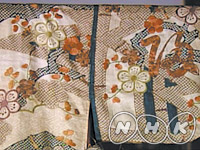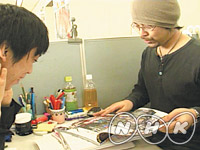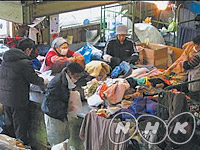TV Station NHK
 The Mark of Beauty | Chopsticks
The Mark of Beauty | Chopsticks
DC330802![]()
美の壷 | 箸 [NHK]
![]()
![]()

|Length : 25min. |Year : 2008 |
In Japan, chopsticks are said to have been first used for eating hot dishes.
The beginning of today's widely distributed lacquered chopsticks dates back to around 1660, when the Obama clan was presented with these as gifts. The clan lord liked the chopsticks made by painting lacquer on plain wood and called it "wakasa-nuri". Chopsticks are used to carry food to the mouth, but they also perform various functions including cutting, dividing, picking and scooping. As a tool, chopsticks have a few secrets in their design that don't compromise their beauty. Even the tree used as material carry special meanings and hopes. This program introduces the meanings and functional beauty of chopsticks, an item essential in daily life for all Japanese.
 The Mark of Beauty | Yuzen-dyed Kimono
The Mark of Beauty | Yuzen-dyed Kimono
DC330801![]()
美の壷 | 友禅 [NHK]
![]()
![]()

|Length : 25min. |Year : 2008 |
There are many types of kimono in Japan, depending on the pattern and style, and one of the most gorgeous is the yuzen kimono. Introducing the transcendent yuzen craftsmanship that makes possible a painting-like freedom of design, the scrupulous selection of water to support the richness of color, and the caution points women must observe when wearing this kimono, Yuzen-dyed Kimono reveals the splendidly complex dyeing process that makes yuzen kimono so alluring.
 Japan : On-the-Spot Reports | Make a Hit! Launching a Comic Book
Japan : On-the-Spot Reports | Make a Hit! Launching a Comic Book
DC320807![]()
ドキュメント にっぽんの現場 | ヒットをねらえ コミック創刊 [NHK]
![]()
![]()

|Length : 29min. |Year : 2008 |
While weekly "manga" magazines for boys such as the Shonen Sunday and Shonen Magazine are celebrating their 50th anniversary, a series of new manga magazines for boys and girls are being released at around the same time. In fact, despite decreased numbers of publications of existing magazines due among other factors to an aging core readership, there is a new trend that attempts to appeal to the original target age group: kids. One of such magazines is the Monthly Shonen Rival. It targets kids whose first stop after school is the convenience store, and whose favorite activities at home are to watch comedy shows and anime on TV or play video games. To ensure its success, the publisher is focusing its efforts on discovering new talents whose age and sensitivity are as close as possible to those of the readers.
This program takes an up-close look at two new manga artists, one working on a manga where the main character consists of a transforming hero and the other on fourframe comic strips set on campus, and their editor.
 Japan : On-the-Spot Reports | Quality Use of Your Old Clothing
Japan : On-the-Spot Reports | Quality Use of Your Old Clothing
DC320806![]()
ドキュメント にっぽんの現場 | どこへ行く あなたの古着 ~世界に続く再生ライン~ [NHK]
![]()
![]()

|Length : 29min. |Year : 2008 |
Now in Japan various approaches are being taken to make use of old clothing. At clothes sorting factories, part-time workers sort through clothing coming at them on conveyor belts and divide the clothing into 130 categories for shipment to second destinations overseas. This program provides an up-close look at Japanese people's passion for fashion, the techniques of the clothing recycling industry, the obstacles standing in its way, and the efforts of the clothes sorting factories.
 Japan : On-the-Spot Reports | Okinawa Coral Reefs in Crisis
Japan : On-the-Spot Reports | Okinawa Coral Reefs in Crisis
DC320805![]()
ドキュメント にっぽんの現場 | 夏 サンゴの海 沖縄 慶良間諸島 [NHK]
![]()
![]()

|Length : 29min. |Year : 2008 |
Some of the most beautiful coral reefs in the world are found off Okinawa's Kerama Islands at the southern edge of Japan. The 250 different species of coral are a treasure trove for the islands and even provide a means of livelihood for local people. But because of the extremely hot summer in 2007, rising seawater temperatures due to global warming, coral bleaching, and the mysterious so-called white syndrome, the coral reefs are being injured. This program follows local diver and his friends in their desperate fight to protect the coral reefs, revealing the critical situation of the coral reefs and the thoughts of those working to preserve them.














